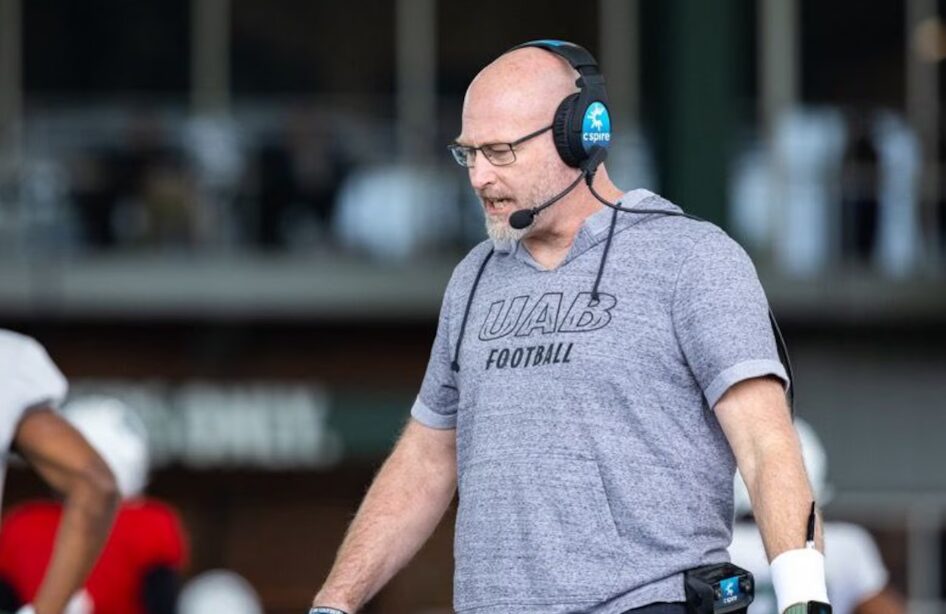
How quickly is too quick to recognize a mistake?
As an athletics director, university president, or board of trustees, when do you acknowledge that the coach you hired to restore success or elevate your program may not be the right fit?
Former Florida AD Jeremy Foley tackled this issue with a well-known leadership principle: “What must be done eventually should be done immediately.”
This shifted away from the outdated notion that a coach needs four or five years to build a program before being fairly assessed.
In today’s fast-paced world of transfer portals and immediate roster changes, it might seem like one year and two games are brief to make a decision. However, it’s not too early to gauge the program’s trajectory.
The initial performances of Auburn’s Hugh Freeze and UAB’s Trent Dilfer in their first seasons last year were not promising. Now, just two games into their second seasons, the outlook appears troubling.
It’s not merely that Auburn lost to Cal 21-14 at home or that UAB fell 32-6 to Louisiana Monroe. A closer look at these disappointing losses raises significant doubts about the future of either program under their current leadership.
Freeze seems to have lost his ability to effectively identify and develop a quarterback, create a solid game plan, and call the right plays during games. Despite his optimistic offseason remarks, Payton Thorne—now in his sixth year of college football and fourth as a Power 4 starter—appears to be struggling again, possibly as the worst quarterback in the SEC.
Thorne threw five interceptions on Saturday, although only four counted since one thrown in the end zone was erased by a questionable defensive pass interference call. Given a second chance, Auburn managed to score and reduce Cal’s lead to 21-14.
However, Thorne added two more interceptions afterward—one due to a poor choice and an underthrown ball, and the other resulting from a misunderstanding with a wide receiver. Following a promising debut against an easy opponent, Auburn’s revamped receiving corps was mostly quiet against Cal after an initial touchdown drive.
While the Auburn offensive line had its issues, Thorne—despite his experience—still reacts too quickly at the first sign of a pass rush.
As Freeze heads into his second season, with SEC play starting in two weeks against a stronger Arkansas team, he faces a self-created dilemma at the key quarterback position. When a head coach struggles in the area where he has previously excelled, it often leads to a swift exit.
Every Auburn coach from Pat Dye to Gus Malzahn made notable progress in their first two years, but Bryan Harsin broke that trend. Freeze’s chances of reviving that legacy have dimmed significantly after a disappointing game that the Auburn community would rather forget.
Saturday was a tough day for UAB and Dilfer, who has yet to show any signs of becoming a successful college coach. After Bill Clark’s tenure, which ended due to major back surgery, Mark Ingram and Ray Watts had several candidates to choose from, including Bryant Vincent, who stepped in as interim head coach in 2022. Vincent’s 7-6 record was misleading, as five of the losses were by a single score, with the exception being a game against LSU. He left on a high note, leading UAB to its sixth straight winning season and a historic bowl victory.
Instead, UAB’s decision-makers opted to hire Dilfer, who had no college coaching experience, rather than promote Vincent or someone from the coaching tree of the successful Clark. This choice was made despite the team moving into a tougher conference, the AAC.
Vincent reminded everyone what a well-coached team looks like, as his Louisiana Monroe squad faced the Blazers with confidence and controlled the game. The Warhawks took the victory, showcasing a strong defense and effective running game—traits associated with Clark’s successful style that UAB failed to replicate under Dilfer. Dilfer’s promise of an explosive offense fell flat, as UAB didn’t score a touchdown, marking the fewest points ULM had allowed since 2015.
While it’s still early in the season for both Dilfer and Freeze, their performances against weaker opponents have been disappointing. Freeze is now 7-8 at Auburn, reflecting mediocrity, especially with four losses in the last five games. Dilfer stands at 5-9, taking over a UAB program that hadn’t seen a losing season since 2013, and his team has yet to win two games in a row.
Historically, turning programs around at UAB and Auburn doesn’t take long. Under Clark, UAB achieved its first winning record in 2017 and had notable success shortly after. At Auburn, several coaches, including Dye and Malzahn, achieved significant milestones in their second seasons.
Given this context, it’s reasonable to expect both Freeze and Dilfer to show marked improvement in their second years. However, Saturday’s setbacks suggest that achieving this may be a challenge for either coach.

Leave a Reply